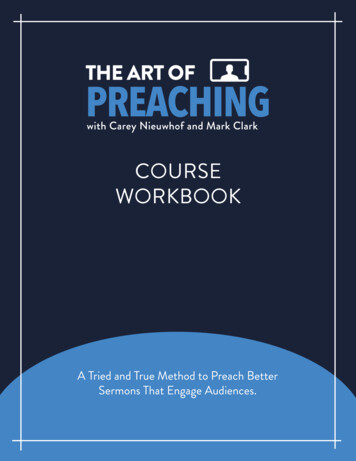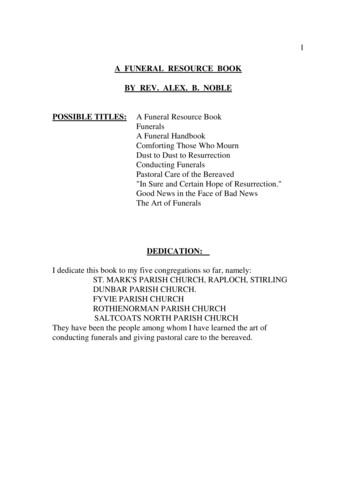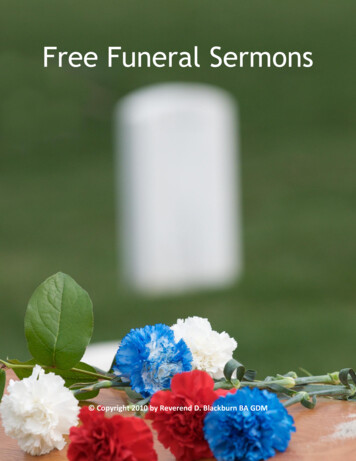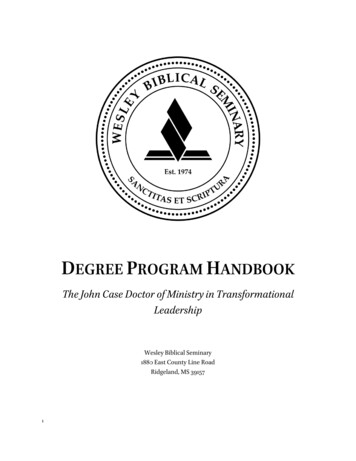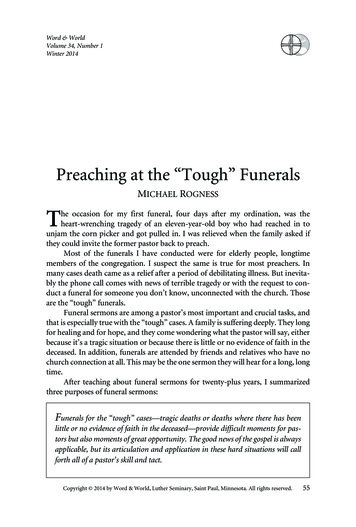
Transcription
Word & WorldVolume 34, Number 1Winter 2014Preaching at the “Tough” FuneralsMICHAEL ROGNESSThe occasion for my first funeral, four days after my ordination, was theheart-wrenching tragedy of an eleven-year-old boy who had reached in tounjam the corn picker and got pulled in. I was relieved when the family asked ifthey could invite the former pastor back to preach.Most of the funerals I have conducted were for elderly people, longtimemembers of the congregation. I suspect the same is true for most preachers. Inmany cases death came as a relief after a period of debilitating illness. But inevitably the phone call comes with news of terrible tragedy or with the request to conduct a funeral for someone you don’t know, unconnected with the church. Thoseare the “tough” funerals.Funeral sermons are among a pastor’s most important and crucial tasks, andthat is especially true with the “tough” cases. A family is suffering deeply. They longfor healing and for hope, and they come wondering what the pastor will say, eitherbecause it’s a tragic situation or because there is little or no evidence of faith in thedeceased. In addition, funerals are attended by friends and relatives who have nochurch connection at all. This may be the one sermon they will hear for a long, longtime.After teaching about funeral sermons for twenty-plus years, I summarizedthree purposes of funeral sermons:Funerals for the “tough” cases—tragic deaths or deaths where there has beenlittle or no evidence of faith in the deceased—provide difficult moments for pastors but also moments of great opportunity. The good news of the gospel is alwaysapplicable, but its articulation and application in these hard situations will callforth all of a pastor’s skill and tact.Copyright 2014 by Word & World, Luther Seminary, Saint Paul, Minnesota. All rights reserved.55
Rogness1. Proclaim the gospel to the survivors. The heart of our faith is that becauseJesus was raised, death is not the last word.2. Do pastoral care, dealing with the theological issues raised by the situation—in addition, of course, to the pastoral care given by the congregationbefore and after the funeral (yes, including hot dishes to the home and thecoffee hour after the funeral).3. Highlight memories of the deceased that witness to faith and church life,giving thanks for all the person has meant to the family and the church. Thegrandchildren who live far away need to know Grandpa’s favorite hymnsand Bible verses.For most of our funerals we know how to do this. For the tough cases it maynot be at all clear what we should say in the sermon, and yet those may be our mostimportant sermons!BE AWARE OF WHAT FAMILIES ARE HEARINGIn tragic situations, people want so very much to give some kind of comfortto the bereaved. They try to think of something positive, but say things that aren’tvery helpful at all. Even family members say such things. We’ve all heard thesecomments:“It must have been God’s will.”“God must have wanted another angel.”“Isn’t it fortunate you have other children?”“Don’t grieve. She’s in a much better place.”“Don’t worry; you’ll get over it in time.”“They really made Grandpa look good in the casket.”One of the worst attempts at comfort was what a family friend said to my parents after my twenty-four-year-old brother was killed: “The last time I saw Paul hedidn’t look very well. Maybe he was about to suffer a terrible disease, so God willedthe accident to prevent it.”These statements are well meaning and some even contain a grain of truth.But they seldom help those who are grieving and may make the situation worse. Asa pastor, be prepared to deal with the aftermath of hearing such comments. It’sequally important to know what not to say as to know what one can say.FIND A FITTING TEXTOne of my early funerals was for a high school student. He had been cut fromthe football team, his girlfriend was breaking up with him, and he was in a bit oftrouble at school. In a momentary fit of despondency, he came home from schooland shot himself. In the next couple of days, I was astonished to discover howmany people in the community were surprised that the funeral would be in thechurch. The customary assumption in the community was that persons who com56
Preaching at the “Tough” Funeralsmitted suicide could not go to heaven and should not be buried from the church orin the church cemetery.I called a wise pastor in the next town and asked his advice for text. He said,“You want Psalm 130.”I said, “Yes, I know the psalm: ‘Out of the depths have I cried unto thee, OLORD. Lord, hear my voice: let thine ears be attentive to the voice of my supplications’” (Ps 130:1–2 KJV).“That’s right,” he said, “but it’s the next verses you want: ‘If thou, LORD,shouldest mark iniquities, O Lord, who shall stand? But there is forgiveness withthee, that thou mayest be feared’” (vv. 3–4).It was the perfect text. Of course suicide is wrong, but we all do wrong, and ifGod were to count our wrongdoings, we would all be lost.One of our seminarians interning in Alaska conducted the funeral for ayoung man who had been swept off the deck of a fishing boat in the storm-tossedBering Sea and had drowned. The intern looked up verses that mentioned the seaand oceans. He found the perfect texts in Pss 46 and 93:God is our refuge and strength, a very present help in trouble.Therefore we will not fear though the earth should change,though the mountains shake in the heart of the sea;though its waters roar and foam. (Ps 46:1–3 RSV)The floods have lifted up, O LORD,the floods have lifted up their voice, the floods lift up their roaring.Mightier than the thunders of many waters,Mightier than the waves of the sea,the LORD on high is mighty! (Ps 93:3–4 RSV)He ended the sermon by returning to the texts: 1The sea took him from us, but that is not the end of his story. There is onemightier than even the waves of the sea. There is one who created the windand the waves and the breakers of the sea. God is our refuge and strength, avery present help in trouble. Therefore we will not fear though the waters rageand foam. The waters have lifted up, O Lord, the waters have lifted up theirvoice; the waters have lifted up their pounding waves. Mightier than the thunders of many waters, mightier than the waves of the sea, the Lord on high ismighty.Some years ago I attended the funeral of a twelve-year-old boy killed in afreak accident when a rock pitched from a neighbor’s lawn mower hit him in thehead. When the pastor announced his text as 2 Sam 12:15–23, I wondered whatthis passage could possibly hold for this situation. It was the aftermath of David’sadultery with Bathsheba. When their son was stricken, David mourned. When theboy died, the court attendants were worried about David’s possible rage or despair.1This and the following sermons were shared by students in classes at Luther Seminary or in personal communication and thus made public with the permission of the authors. All names in the sermons are fictitious.57
RognessThey were astonished that the king returned to his duties. David explained, “Whilethe child was still alive, I fasted and wept. But now he is dead; why should I fast?Can I bring him back again? I shall go to him, but he will not return to me” (vv.22–23). We don’t know exactly what David meant, but the message of the text isthat there will be a reunion on the other side of death. For the funeral of this boy, itwas a powerful and meaningful text.A pastor I know well was called upon to bury a young nineteen-year-old whohad finally kicked his alcohol addiction after many prayers from his parents, onlyto be killed by a reckless driver. The pastor picked Mark 9:14–29 as the text, thestory of a son possessed of an evil spirit brought to Jesus by his father. Jesus “tookhim by the hand and lifted him up, and he was able to stand” (v. 27). The parallelwas striking—a father bringing his evil-ensnared son to Jesus, who reached out tolift him up. The pastor ended the sermon:That describes Steve’s victory so perfectly. For the first time in such a longtime, by the power of Christ, Steve is able to stand, next to Jesus, straight andtall, handsome and happy, peaceful and free. Jesus has taken him by the handand lifted him up, and Steve is standing now, standing tall, standing firm,with the Lord.ARTICULATE WHAT PEOPLE ARE FEELINGI once attended a funeral of a young man who had been killed by a tragic accident. The preacher apparently wanted to find something reassuring to say. Thesummary of his sermon was, “He had a wonderful life and is now in heaven.” It wastrue, of course, but he was implying that we shouldn’t be sad anymore, when wewere still grieving deeply that this promising life was cut short and feeling how wewere missing him so much. If people listening to a funeral sermon sense “thepreacher has no idea what I’m thinking and feeling,” the sermon has misfired.if people listening to a funeral sermon sense “the preacher has noidea what I’m thinking and feeling,” the sermon has misfiredShortly before Christmas a young pastor in northeast Minnesota had to conduct a funeral for a newborn baby who lived only a few days. She chose Rom 8 forthe sermon: “We are more than conquerors. ” She began the sermon:“In all these things we are more than conquerors through him who lovedus. ” That is what the apostle Paul writes. But how? How are we more thanconquerors? If we are conquerors then why does it seem that today we are theconquered ones? Why did death take Susanna away? Why was not Susannahealthy at birth? Why were your hopes dashed? Why was the one so longawaited taken away so quickly and painfully? Today it seems that death hasconquered us.You so eagerly awaited Susanna’s arrival, waited and waited with dreams of allthat your new child would bring and mean. Susanna was born. Almost imme58
Preaching at the “Tough” Funeralsdiately there was difficult waiting. Waiting from the moment the doctortold you that not everything was right.In these last weeks and days you have known the terror of dreadful waiting.Waiting dabbing water on her tongue a drop at a time with your fingertip hoping this would keep her from being so thirsty. Then she died. A partof you has died. After many months of eager waiting and these last weeks ofdreadful waiting—for what is there now to wait? Where is the hope in thisvery minute? What is the hope for the time later this afternoon when youleave this building? What is the hope for the days ahead?That’s exactly the bleak grief everyone was feeling. After speaking so plainly of thedesolation of death, what can the preacher say now? She continued,Susanna was not a healthy baby—I don’t know why. I don’t know why yourtiny Susanna had to have tubes running in and out of her fragile body. Theseare questions I cannot answer. But I will tell you that of which I am sure. Godis love and nothing can separate us from that love. For the ultimate revelationof that love we wait. In that love is our hope. It is that love of God which cradles each one of you here today.God is love—how can I even dare to say that? Susanna is dead. What kind oflove is God’s love? Is it a love that would let Susanna die? What kind of love isGod’s love? How can we comprehend it? Know it? Grasp it?Out of the grief and questions the gospel begins to emerge. The good news nevercancels the grief, but God comes near to us in that grief. The sermon continued,Christ came to us at Christmas. The only Son of God came as a baby—a vulnerable, tiny baby like Susanna. In other words, love came to us at Christmas.All of God’s love for us came as a baby that you could hold and cradle in yourarms, exactly as you cradled Susanna. The apostle Paul tells us that God didnot spare his only Son—but gave up his child. You know how much thathurts God knows how much it hurts. I’m not talking about a sentimental,sweet love. The love of God is not that. God’s love is an extreme love, aclose-to-the-bone love, a love that knows hurts and fears of even a tiny babylike Susanna. God’s love knows the pain of losing a child, because his Son diedon the cross.The preacher went on to say that out of the death of God’s son came resurrectionand eternal life. The sermon did not flinch from articulating the pain of loss anddeath, but ended with the message of life and love.One of our seminary interns preached at the funeral of a young woman, adear friend with three young children, who succumbed to cancer. She began thesermon with Ps 121 as the text:Psalm 121 is filled with the promises that Lucille proclaimed daily. This psalmcarries the message of the Lord watching over and protecting his people. “TheLord is your keeper; the Lord is your shade on your right hand. The sun shallnot smite you by day, nor the moon by night” (vv. 5–6). These are powerfulpromises!59
RognessBut she knew exactly what the family would be thinking upon hearing Ps 121. Shewent on,But as we think of Lucille’s last days and experience our own grief, it’s hardnot to ask the questions, “Lord, did you fall asleep? Lord, have you closedyour eyes? Where was your shade as Lucille endured the radiation therapy?Where is your shade as we are left exposed to the reality of Lucille’s absence?Lord, are you sleeping?”The psalm promises that “the Lord will keep you from all evil; he will keepyour life.” But where was the Lord as Lucille struggled with that evil cancerand we watched it overtake her? Where was the Lord when Lucille spoke forthe last time and closed her eyes? Lucille’s life was taken from her and from usand now you are left without a wife, without a mother, without a daughter,without a grandmother, without a friend. Has the Lord gone to sleep?This is exactly what the family has been thinking. Their faith has been badly shakenby these questions. After delving so deeply into the family’s pain, how should thepreacher continue? She went on,“I lift up my eyes to the hills. From whence does my help come?” Take youreyes off of the hills. Take your eyes away from the sky. Because right now youwon’t see God on the hills. You won’t see God in the clouds. You won’t seeGod sitting on a throne, robed in splendor.But your help does come from the Lord—from the Lord Jesus who hung onthe cross with nails through his wrists and thorns penetrating his scalp. Yourhelp comes from the Lord who cried out, “My God, my God, why have youforsaken me?” and hung his head to die.Bring your eyes down from the hills. Allow your eyes to focus on theground—to focus on the depths of your grief, on the depths of your sorrow,because it is there that you will see the Lord from whence your help comes.The Lord was with Lucille in her suffering. The Lord was continuously atLucille’s bedside, never once falling asleep as they suffered together throughout the days and the nights. The Lord kept Lucille from evil and sustained herlife as they entered death together. Our Lord Jesus who suffered on the crossand was buried in the tomb conquered death and rose again to life—a life towhich he will escort Lucille.Just as the psalm promises, the Lord was with Lucille throughout her life. Hedid not abandon her in her pain and he continues to keep her life even indeath.The expression of grief was deep and real, and the promise of the gospel was evenmore powerful. I thought the funeral was finished, but she continued with a profound expression of pastoral care, encircling the whole congregation in the healingministry for a grieving family:Bring your eyes down and look at all of those around you. From whence doesyour help come? Look and you will see the Lord in your family and yourfriends. You will see the Lord as they cry with you. You will experience theLord as someone sits silently with you. You will feelthe Lord’s healing touchas you hug and embrace one another. You hear the words of the Lord as you60
Preaching at the “Tough” Funeralshear each other speak words of consolation, words of happy memories, wordsof hope and new life. You will know the Lord’s concern as you readthe cardsand letters from people who care. Our help comes from the Lord, who madeheaven and earth and who now lives within each one of us.DON’T MAKE GOD’S JUDGMENTSWhat do we say at a funeral of a person with no evidence of faith or churchmembership? This is a hugely complicated issue. In our seminary preachingclasses, our most vigorous and wide-ranging discussions are those that follow suchfuneral situations. Here I can only relate what I have done.One day in my last year in the parish, a woman came to my office and handedme a newspaper article about her son who had hanged himself in the HennepinCounty jail. It was a sad, sad story. He was a petty criminal and had been regularlyjailed for short terms after various inept burglaries. The only light in his life was hisinfant daughter, but his wife had told him that if he were to be jailed again, shewould leave and he would never see his daughter again. At his next attempt at theft,he was caught. His wife left town and, in his despair at the possibility of never seeing his little girl again, he took his own life.At funerals of baptized and believing Christians, I do not hesitateto proclaim the clear promise of the gospel that the person has gonehome to God. But with the “tough” cases I cannot say who is goingto heaven and who isn’t, and I must not speculate.During our conversation, his mother asked me several times, “Tell me, pastor, will Bruce go to heaven?” She didn’t think he had been baptized, but he had attended our Sunday School during his childhood. “Will he go to heaven, pastor?”At funerals of baptized and believing Christians, I do not hesitate to proclaimthe clear promise of the gospel that the person has gone home to God. But with the“tough” cases I cannot say who is going to heaven and who isn’t, and I must notspeculate. I think of Rom 8:31–39 as the “funeral text of last resort,” so to speak,ending as it does with, “For I am convinced that neither death, nor life, nor angels,nor rulers, nor things present, nor things to come, nor powers, nor height, nordepth, nor anything else in all creation, will be able to separate us from the love ofGod in Christ Jesus our Lord” (vv. 38–39). We cannot say for sure whom Paul hasin mind in writing these verses, but the plain meaning of the text is that God’s lovesweeps all human beings into its embrace. That’s what I told the mother that day.I have no record of what I did at the funeral, but I’m quite sure I read Rom 8.A funeral sermon is for the survivors, and when I officiate at the funeral of aperson apparently unconnected with the Christian faith or the church, I speakabout meaningful memories the family has about the dead person. In Bruce’s funeral, I assume I mentioned that he attended Sunday School at our church. I also61
Rognesssay that God loves all people. But then in these instances I go on to proclaim to thesurvivors our hope of eternal life thanks to the life, death, and resurrection of ourLord, Jesus Christ. I do not speculate about the person’s eternal destiny or grasp atstraws or hints of faith or good works. I would never say, for example, somethinglike, “We have hope for Bruce’s eternal life because at least he did attend SundaySchool.”I also do not speculate why the death happened. Did God decide to “takeGrandma home”? Did God decide that seventeen-year-old Bobby would die whenhis friend Tom fell asleep at the wheel? Why didn’t God prevent it? Could God prevent it? These are questions that stricken families inevitably ask. Personally, I find itdifficult to believe that God “called home” a child with leukemia. It’s fashionabletoday to say to a grieving family, “God didn’t want this to happen.” It may be comforting to say that, and it puts God in a compassionate light. But who are we to saywhether this happened as God’s will or not?I got my comeuppance as a young pastor when a physician in our congregation asked me to call on a young boy dying of leukemia. The family did not belongto a church. As a young pastor, eagerly wanting to make God appear as loving andcompassionate, I said, “God did not want this to happen.” The parents were crestfallen. Their one source of comfort was in believing that God “wanted Jimmyhome with him,” as they said. Now I took away their only shred of consolation.Never again did I tell people what God is doing in such situations—despite what Ipersonally believe. For this reason I seldom used the second version of the committal formula in the Lutheran Book of Worship: “Since almighty God has called ourbrother/sister from this life to himself. ”2 I was not sorry to see it omitted fromEvangelical Lutheran Worship.3I count funeral sermons as one of my most important ministries and, incidentally, one of the prime opportunities for evangelism. People are hungry for thegospel, and a funeral sermon will always be the glorious, uplifting good news thatin Jesus life overcomes death. That message will ring most vibrantly in these“tough” situations.MICHAEL ROGNESS is professor emeritus of preaching at Luther Seminary, Saint Paul, Minne-sota.2“Burialof the Dead,” Lutheran Book of Worship (Minneapolis: Augsburg, 1978) 213.Lutheran Worship (Minneapolis: Augsburg Fortress, 2006).3Evangelical62
tall, handsome and happy, peaceful and free. Jesus has taken him by the hand and lifted him up, and Steve is standing now, standing tall, standing firm, with the Lord. ARTICULATE WHAT PEOPLE ARE FEELING I once attended a funeral of a young man who had been killed by a tragic acci-dent. The preacher apparently wanted to find something reassuring .


